At this Louisiana Farm, Activism, Family, and Food Form the Sweetest Harvest
For the Provost family, harvesting winter’s sugarcane crop isn’t just a living — it’s a way of life.
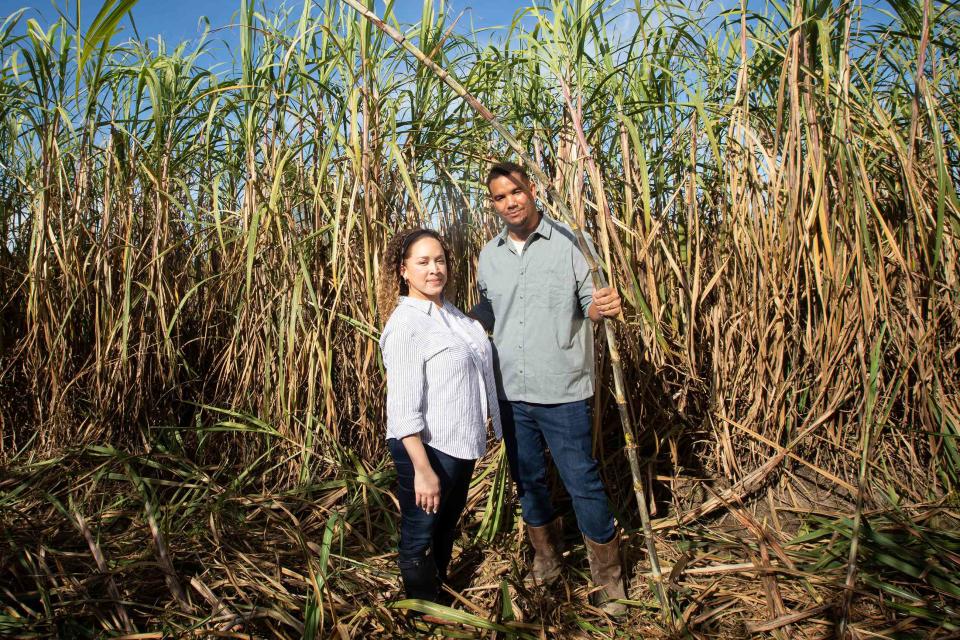
Clay Williams
When Wenceslaus “June” Provost Jr. comes out to the sugarcane field in New Iberia, Louisiana, the first thing he does is open up a window.
Not a house window, but a window through the sugarcane field, an opening that he creates using a tractor. It’s one of the first steps of harvesting the cane and something that he’s done throughout his life, and that his family has done for four generations. Now able to walk in the newly cleared pathway, June beams as he gazes into the row of cane, glowing gold and green under the Louisiana sun on a warm December day. He grabs a 12-foot stalk and pulls the leaves off what he explains are the eyes and joints of the sugarcane. Surrounded by rows upon rows of the perennial grass, he talks about the harvest season, the tractor blades, the proper way to juice sugarcane once it’s cut, until he pauses and says:
“I’m sorry to rant on y’all, but it is gorgeous.”
But there’s no reason for an apology. June’s “rants” sound like love songs. His wife, Angie, joins him in this reverence for the sweet stalk. Descendants of generations of sugarcane farmers, June and Angie have become nationally known for fighting against racial discrimination in farming. In Nikole Hannah-Jones’ “The 1619 Project,” an ambitious journalism series launched in 2019 that looked at the lasting legacy of slavery in America, June and Angie shared their story of land loss due to systemic racism.
In the early 2000s, after the Provost family had been farming sugarcane for about 100 years, June’s father bought a 5,000-acre farm. Today, the Provosts rent 1,000 acres of land about 3 miles from their old farm, which in 2014 was taken and resold for parts to white landowners and sugarcane farmers. (The Provosts filed a lawsuit in 2018 against their local bank, detailing years of predatory lending, racially discriminatory actions, and other unfair practices through the U.S. Department of Agriculture’s Farm Service Agency’s loan guarantee program that made it impossible for them to produce their crop and pay off their loans. The lawsuit was settled out of court in 2021.) The Provosts’ new land sits on a massive piece of a farm that’s owned and shared by several Black farmers in the area, part of a new effort to protect their land. It’s given the Provost family an opportunity to reconnect with a crop that’s been central to their lives as well as their livelihood.
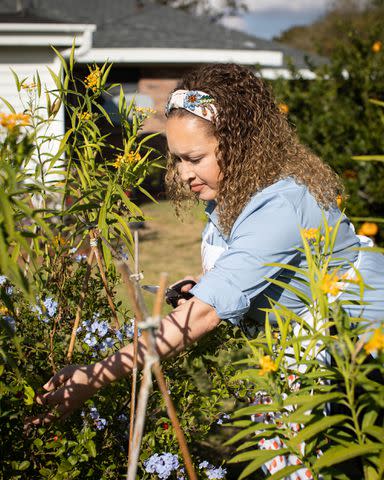
Clay Williams
“To this day, I get chills from being out here,” June shares as he tenderly touches the joint of a sugarcane stalk.
Surrounded by a crop that towers over the tallest adults during the peak of harvest season, June stands proudly with Angie, who also comes from a Creole family of sugarcane farmers. As the two walk hand in hand through a maze of cane, both are optimistic about their future, knowing that successfully harvesting sugarcane is in their blood.
“I remember as a little boy, me and my dad were sitting in the back of the tailgate on a truck, and I remember him giving me pieces of sugarcane and me being able to chew it and absorb all that juice,” June says with a smile. “It’s memories like those that keep me going.”
The Provosts’ story of anguish and ruin has been told and retold again. Today, they’re less interested in a story of agony and are instead reclaiming their love of their crop and the critical role it’s played in Black economics and Black food. In 1920, there were nearly a million Black farmers in the U.S., about 14% of all farmers. Although sugarcane farming was notoriously brutal during slavery, once slavery was abolished, families like June’s opted to tend to their own farms — harnessing the skill and joy that comes from farming — and tried to flee the cruelty that had historically characterized the sugarcane industry. But troubles still plagued many Black farmers across the nation, and today, after more than a century of overt racism, land loss, and fear-mongering tactics by insecure white farmers, less than 2% (just over 45,000) of American farmers are Black. June’s family, however, held on. Until their legal battle, June’s family farm was known as one of the best sugarcane farms in Louisiana.
“Folks ask, ‘How can you continue to farm sugarcane when it has such a brutal history with our people and in this country and globally?’” says Angie. “And we’re like, ‘It’s not sugar and it’s not sugarcane that’s the problem; it’s systemic racism.’ That’s the burden we have to be released from.”
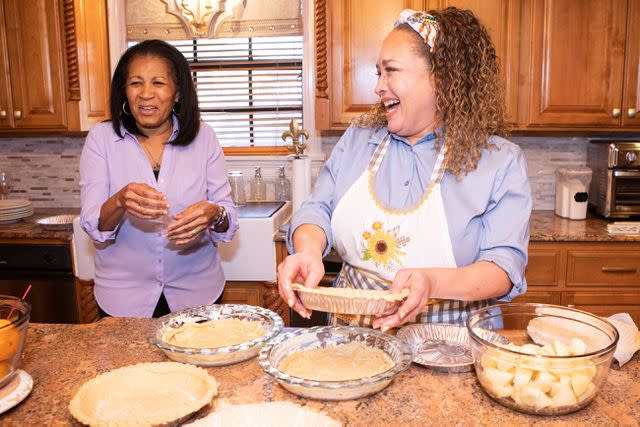
Clay Williams
As June and Angie point out their go-to places in New Iberia (“We ain’t never leaving!” Angie tells me enthusiastically), it’s easy to see why they love this small town and work so much. There’s tranquility, a seemingly endless expanse of land, and there’s soul, too. It’s why the couple is seeking new ventures: In addition to tending to a new farm, the Provosts are setting their sights on new business frontiers. They are working on creating a rum brand by distilling their own fermented sugarcane. They plan to make rhum agricole, which is not processed through acid and is thus more sustainable. The couple is hoping to release bottles next year.
“We’re still activists. Our primary goal is to change policy and laws and culture,” says Angie. “But if we could get some rum bottles on the shelves of restaurants and stores, we would be completely elated.”
They are focusing on community, too. June and Angie are collaborating with the University of Louisiana at Lafayette to develop a heritage center that will, among other actions, serve as a repository for information and history on Black farmers in Louisiana; host a community garden filled with culturally relevant produce like okra, corn, and tomatoes; and offer courses and mentorship for young Black students interested in agriculture careers. They are hoping to soon offer heirloom seeding — which will provide older, regionally specific seeds that the Provosts will harvest themselves — to offer rare varieties of sugarcane, beginning with their recent cultivation of purple sugarcane.

Clay Williams
Central to all their efforts is pursuing their definition of reparations: playing a critical role in the national fight for payment owed to tens of thousands of Black farming families just like theirs who’ve been directly impacted by unfair farming practices. The Provosts advocate for land ownership rights for marginalized farmers and stand for more sustainable agricultural practices. They note that many of those practices were developed by the Black and Indigenous farmers who built American foodways yet were unable to profit from their own work — work that has made many white landowners extremely wealthy.
“One of the key things about agriculture: It’s been Black people who have invented and have codified the industrialization of agriculture and the modernization of agriculture,” says Angie. “Throughout history, it’s been us, but we’ve never been able to reap those benefits. We’re trying to educate people about this problem, and we’re trying to change these systems.”
For the charming couple, it’s futile to discuss sugarcane and its role in African American life and economic advancement without talking about sugar. June does so while juicing some sugarcane to cool down during an afternoon on the farm. He says they’re at the start of the process, where farmers like him spend nearly a year harvesting sugarcane. Using a juicing machine, stalks are crushed, soaked, and squeezed. On this particular day, he drinks the fresh, perfectly sweet, syrupy juice. When the harvest is in full swing, the very same juice is boiled and crystallized into sugar. The sugar is then placed in a centrifuge, which removes liquid and turns it into raw sugar. June will then work to remove any remaining impurities and extract the color to produce sugarcane syrup.

Clay Williams
During the winter holidays, the Provosts get to demonstrate the value of sugarcane in the enduring recipes they make for family feasts. The potato salad is layered with dashes of sugar; a crawfish pie uses sugar to create a less acidic — and more indulgent — slice. When June and Angie are cooking, it’s a party. Friends and family arrive from cities like nearby Lafayette, Los Angeles, and Richmond, Texas. Fresh off the road, the family slips into their Creole dialect, exchanging niceties, teasing, and joking as families do. (“OK, I see you cousin!” and “Who’s making the crawfish pie?! Oh, OK, good. Angie is!”) They gather round, sipping on Uncle Nearest, sneaking bites of Angie’s aunt Ester Ardoin’s irresistible pralines, and line dancing to zydeco. As Angie adds a little bit more sugar to the crawfish pie (“Just a liiiiittle bit more!” she squeals mischievously), June methodically makes a classic Old-Fashioned. The living room speaker belts out Curtis Mayfield’s “The Makings of You,” and June whisks Angie to the dance floor for a public display of affection. They hold onto each other as Mayfield belts sweet, romantic lyrics the way only Mayfield can (“Add a little sugar, honeysuckle andddd!”), and everyone watches in bliss, knowing that of anyone — of all people — Angie and June deserve the love and peace so vividly displayed.
“I love this woman, y’all!” June says as he twirls Angie one more time before returning to the kitchen.
After dancing, the Provosts wrap up dinner preparations and indulge in a sweet and savory meal centered around the sugarcane harvest. It starts with an appetizer of crackers, cheese, and fig preserves from June’s mother, Bernadette Provost, known as “Maw Maw B.” It’s followed by doughy, buttery slices of crawfish pie, a roasted kale salad, and Maw Maw B’s beloved candied yams. They finish the meal with cold glasses of June’s whiskey-forward Old-Fashioned, sweetened with cane syrup and garnished with a small piece of sugarcane stalk to chew. At the Provosts’ holiday table, talking about Black American history and the beauty of Black American food is what makes for a truly joyous and exuberant celebration.
“Sugar is in every dish we have for the holidays,” Angie says. “You can’t get away from it—but then again, why would you want to?!”
For the Provosts, sugarcane isn’t just food; it’s a tool to discuss progress. They are determined to create a future where no Black farmer endures the loss they experienced. According to June and Angie, a little bit of sugar might just be the antidote.
Recipes
Creole Crawfish Pie
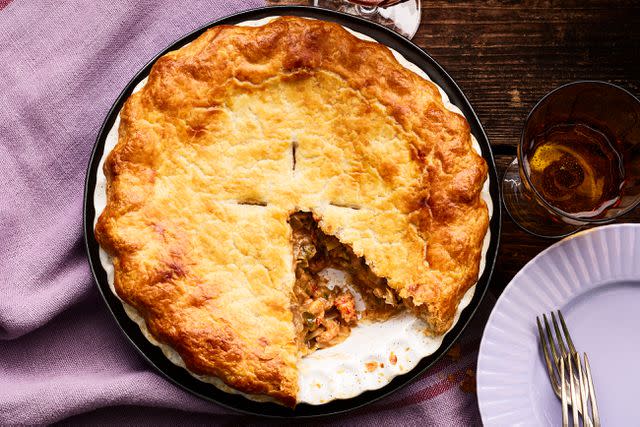
Victor Protasio / Food Styling by Margaret Dickey / Prop Styling by Jillian Knox
This savory pie is filled with rich and creamy Creole-spiced tender crawfish and green bell pepper and is topped with a flaky crust.
:Get the Recipe: Creole Crawfish Pie
Maw Maw B’s Preserved Figs
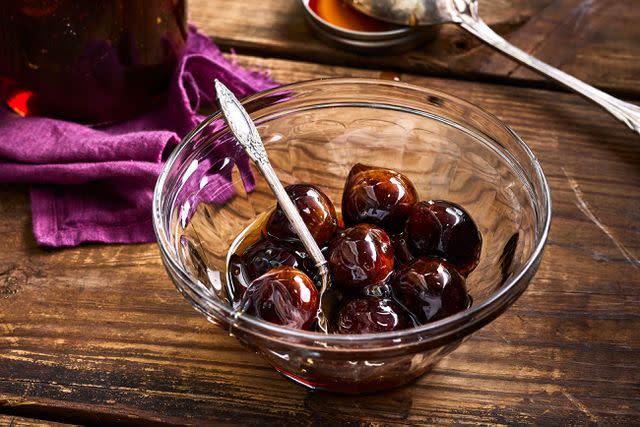
Victor Protasio / Food Styling by Margaret Dickey / Prop Styling by Jillian Knox
This recipe for Preserved Figs by Bernadette Provost (aka Maw Maw B) showcases ripe figs simmered in a thick, sweet syrup. They’re perfect for serving with cheese.
:Get the Recipe: Maw Maw B’s Preserved Figs
June’s Old-Fashioned
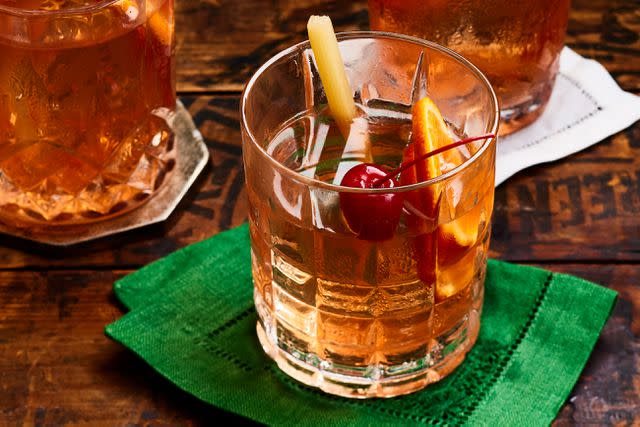
Victor Protasio / Food Styling by Margaret Dickey / Prop Styling by Jillian Knox
This Louisiana twist on an Old-Fashioned combines smooth whiskey, fresh satsuma, cane syrup, and a sugarcane swizzle stick.
:Get the Recipe: June’s Old-Fashioned
Rie’s Pecan Pralines
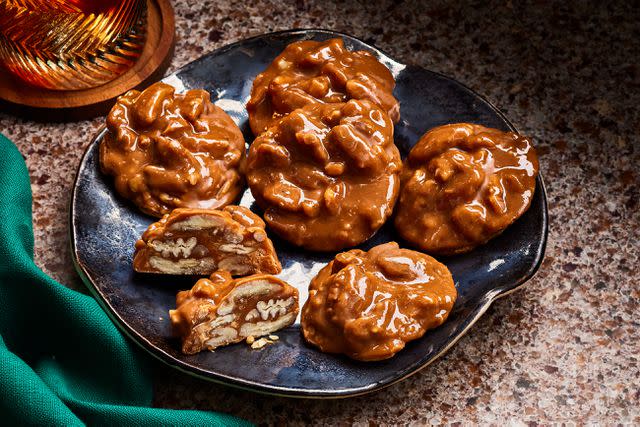
Victor Protasio / Food Styling by Margaret Dickey / Prop Styling by Jillian Knox
These melt-in-your-mouth sugary candies get layers of flavor from nutty pecans, butterscotch morsels, and almond extract and are perfect for holiday gifting.
:Get the Recipe: Rie’s Pecan Pralines
Couche Couche (Cajun Breakfast Cereal)
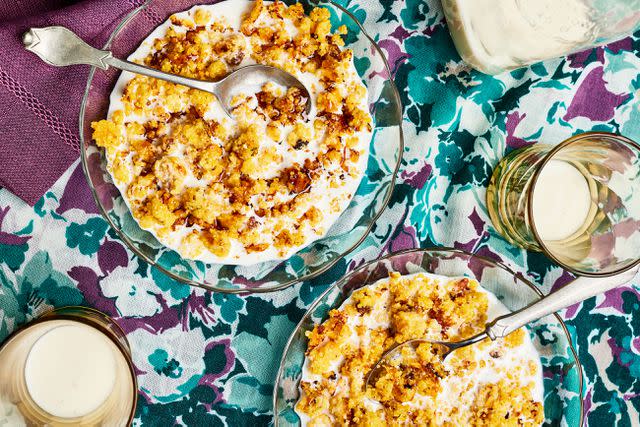
Victor Protasio / Food Styling by Margaret Dickey / Prop Styling by Jillian Knox
This lightly fried, soft and chewy cornmeal cereal is served with cane syrup–sweetened milk and makes a great breakfast or dessert.
:Get the Recipe: Couche Couche (Cajun Breakfast Cereal)
Maw Maw B’s Candied Yams
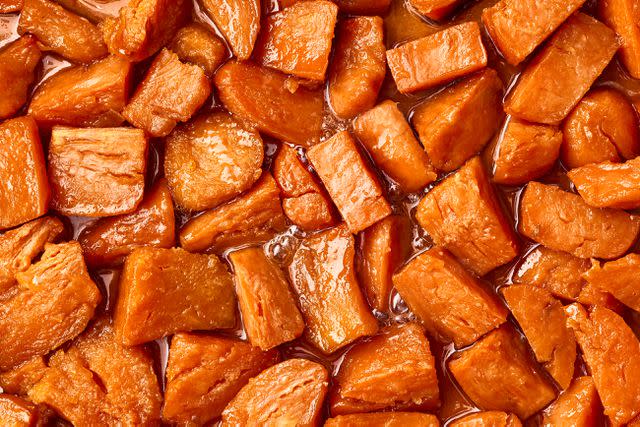
Victor Protasio / Food Styling by Margaret Dickey / Prop Styling by Jillian Knox
These irresistible caramelized sweet treats are made with only three ingredients — canned sweet potatoes, sugar, and butter.

